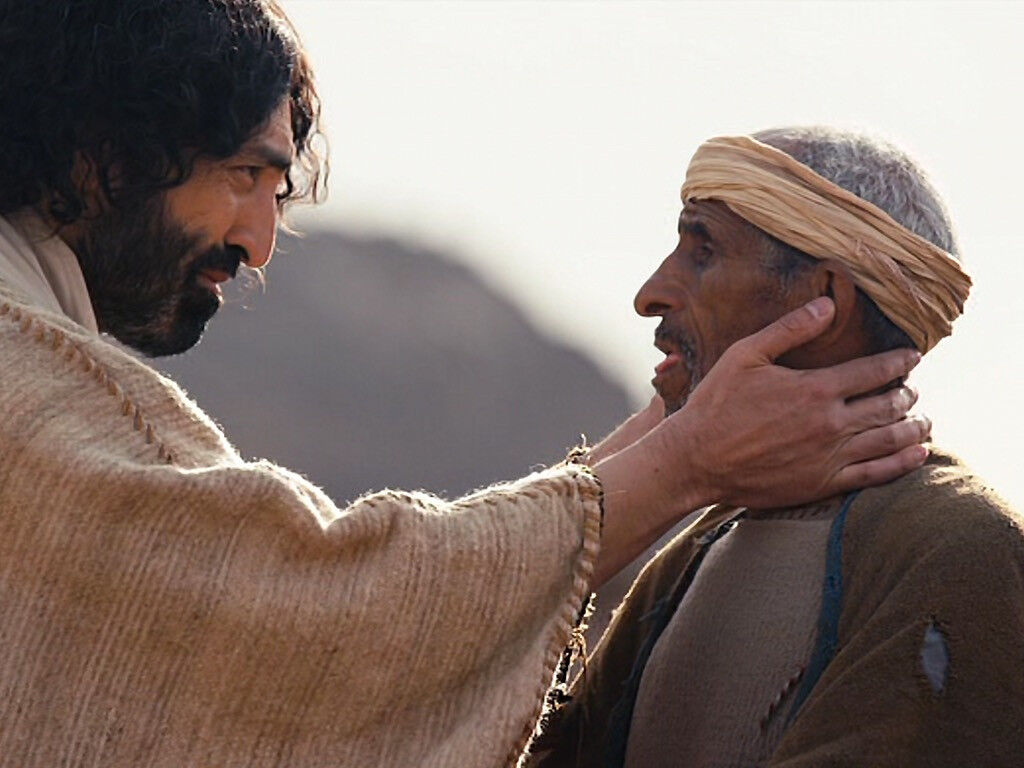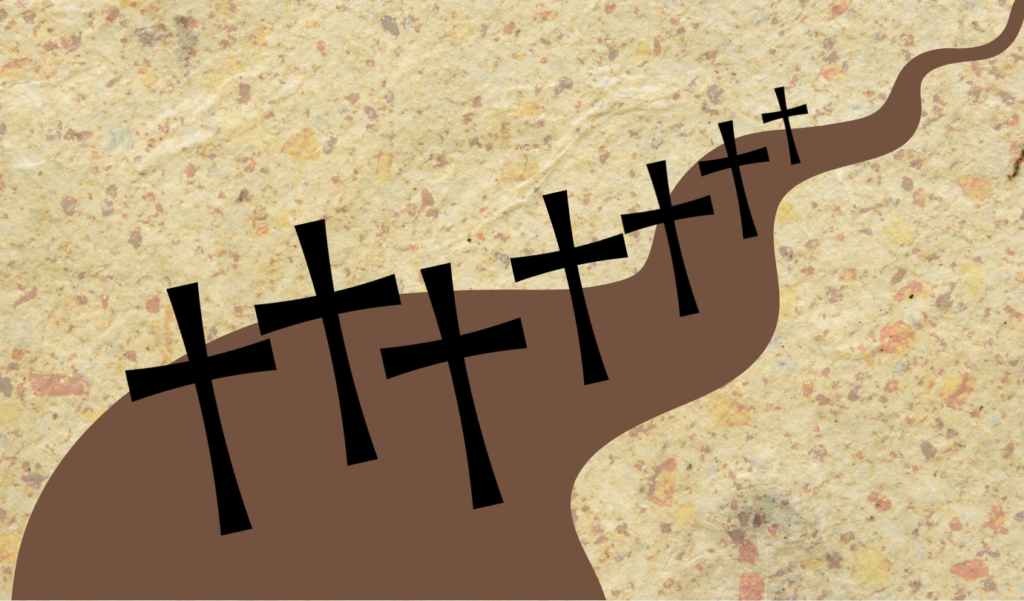Readings: Isaiah 29:17–24 | 2 Corinthians 3:4-11 | Mark 7:31-37
Text: Mark 7:31-37
How are you doing? How have you been feeling? This is how we greet people we care about. But how do we answer this question? We probably have an ideal that we’d judge by, kind of like if a medical professional told us, on a scale of 1 to 10, where you do you think you are? So, what is the ideal? The 10? Is that finally overcoming cancer or being pain-free? How about paying off the credit card? Is it having a healthy frame and a sound mind?

This ideal is what we arrive at from our own experience, and what we’ve been told by others we should expect. But God would have us look for more. In this section of Mark’s Gospel (as I mentioned on the last Sunday in July (Trinity 7)), the Holy Spirit is demonstrating Jesus to be the King of Creation, come to restore—to overcome the evil powers which oppress it, to free those in bondage to decay, and to properly rule as God over His people. This particular healing takes place in a Gentile area—“the region of Tyre and went through Sidon to the Sea of Galilee, in the region of the Decapolis.” Pagan influences abound, and that’s important to keep in mind as we see what happens there:
32 And they brought to him a man who was deaf and had a speech impediment, and they begged him to lay his hand on him. 33 And taking him aside from the crowd privately, he put his fingers into his ears, and after spitting touched his tongue. 34 And looking up to heaven, he sighed and said to him, “Ephphatha,” that is, “Be opened.” 35 And his ears were opened, his tongue was released, and he spoke plainly.
Here is a man who’s bondage to the decay of this world shows up in ears that cannot do what they were made to do—hear. More than that (and perhaps related), his tongue isn’t able to properly do what the mouth is for. The exhortation at the end of the Psalms shows this: “Let everything that has breath praise the Lord!” (Ps. 150:6) This goes beyond the borders of Israel, because this world’s decay is worldwide. In mercy, the Lord has also come to this man.

The Lord, recall who formed this man in his mother’s womb (Ps. 139), now takes him anew to set right what sin and death had corrupted. The Lord Jesus put his fingers into the man’s ears, touched his tongue with His spit, and the Son of God looked up to heaven from where all good comes, and commanded this divine creative word (in plain human language): Ephatha, that is, “Be opened.”
When God set out to redeem this world, He did it by the very place through which corruption had come into the world: mankind. Like we confess weekly in the Creed, “For us men, and for our salvation, He came down from heaven and was incarnate by the Holy Spirit, born of the Virgin Mary, and was made man” (Nicene Creed). And in His holy body, Jesus touched this man’s ears that He might take deafness on Himself. By the water of His saliva and at His Word, He touched the man’s tongue to restore his ability to speak.” And, “Deliver me from bloodguiltiness, O God, O God of my salvation, and my tongue will sing aloud of your righteousness.” (Ps. 51:14)
And once the man was healed, it resulted in his praise, but also that of the crowd:
36 And Jesus charged them to tell no one. But the more he charged them, the more zealously they proclaimed it. 37 And they were astonished beyond measure, saying, “He has done all things well. He even makes the deaf hear and the mute speak.”
This charge not to tell others about the healings is often given by Jesus. It means nothing more than that the Lord did not want the healing to be seen in isolation, a personal miracle for one victim of sin, another there. (If so, the “Healed by Jesus” club would be pretty small and eventually die out!) All of His mighty works were aimed forward toward His cross and resurrection, where He gained for us a healing that is far more expansive than repairing this jalopy of a body we now know.

This is where we must look into the greater salvific meaning behind this healing. This isn’t to allegorize and thereby diminish the miracle which Jesus did, but to show that it means so much more than “Jesus healed this man; He will heal your body too.”
And this salvific meaning is all over the Scriptures, especially highlighted by the inspired poetry of the Psalms and Prophets. One such example is the Old Testament lesson,
“17Is it not yet a very little while until Lebanon shall be turned into a fruitful field, and the fruitful field shall be regarded as a forest? 18In that day the deaf shall hear the words of a book, and out of their gloom and darkness the eyes of the blind shall see…23For when he sees his children, the work of my hands, in his midst, they will sanctify my name; they will sanctify the Holy One of Jacob and will stand in awe of the God of Israel. 24And those who go astray in spirit will come to understanding, and those who murmur will accept instruction.”” (Isaiah 29:17-18, 23–24)
It’s not just the deafness that audiologists treat, but the deafness to God’s Word of sin which silences the voice of the Creator in the hearts of His human creatures. That takes a far greater restoration, which will be demonstrated in the days of Messiah. This is what the Lord is demonstrating here in Mark 7. And this hearing of the words of a book—the Word of God—sets right what was crooked. In ears that did not hear the Word of God, hearts that were indifferent both to the call to turn from wickedness and slow to trust in the Lord as Savior, the Word has done its work: “They will sanctify My Name…and stand in awe of the God of Israel.” Even those who go astray will come to understanding and those who murmur will be catechized.

And this transformation St. Paul marvels at in the Epistle, when he discusses the veil that is over those hearers of Moses. The very Words of the Book of the Law are read in their hearing, but a covering is over their hearts. Though they have the powerful Word of God in their midst, that by itself isn’t enough to accomplish the renewal. Christ and His Holy Spirit must be added, or all is in vain. That is its own reaching of Christ into our ears to open them to rightly hear, and Him touching our tongue to declare His praise. “O Lord, open my lips; and my mouth will declare Your praise.” (Ps. 51:15)
Something also to note about this spiritual restoration is that it does not first take place in the body. It takes place in the soul—where the hearing in faith is, of keeping the Name of God holy, of melting the opposition to God’s instruction. And that is where God is most concerned, because “man looks on the outward appearance, but the Lord looks on the heart.” (1 Sam. 16:7) This is why faith-healers are hacks, because they confuse this. They say God gives sudden bodily healing, but then if the healing doesn’t “work,” they blame the person’s insufficient faith.
Christ has come to reverse the course of the world as we experience it. When we are asked about how we are doing, we usually answer according to our earthly conditions, those things which are subject to chance and change. Our God, however, is working salvation on our hearts, the inner life of the soul, with the promise that the physical will follow—perhaps here in time, but for certain in the resurrection.
This healing begins on the soul, but it, mysteriously, it takes place here in our bodies. This is why the Lord chose to deliver this healing in Baptism. With water made holy in accord with His saving Word, He does all things well. Water washes the body, but it purifies the soul (1 Pet. 3:21-22). The old, dying flesh is touched by water infused with the words and promises of God. “I baptize you in the Name of the Father and of the Son and of the Holy Spirit.” [Matt. 28:19] This washing, because it has the Word of Jesus, is effective at what it does:
”he saved us, not because of works done by us in righteousness, but according to his own mercy, by the washing of regeneration and renewal of the Holy Spirit, 6 whom he poured out on us richly through Jesus Christ our Savior, 7 so that being justified by his grace we might become heirs according to the hope of eternal life.” (Titus 3:5-7)

Ears restored to hear the Word of God, tongues loosed to sing of His salvation, hearts that submit to His rebuke and accept His instruction. These mighty works and more He accomplishes in Holy Baptism. The mighty Lord of Creation came to declare His victory over the devil and the breaking of the unchallenged rule of sin and death. He has come into your life with this same mighty Word, to rescue and restore you from all that His enemies have done to you. He has sent His Spirit to you, who opens your ears, who looses your tongue to sing His praise.
So, ponder how the Lord has healed you by your Baptism in His Name. See how He continues to heal you from your soul outward. In this present life, you and I know the weakness of our bodies, the smallness of our faith. But there is peace for us in the life-giving Words of Jesus. Our faith is renewed by hearing His Word [Rom. 10:17]; our bodies and souls are fed by His Body and Blood for us with His authoritative word: “for the forgiveness of [your] sins.” He who speaks to us is truly God and truly faithful [1 Thess. 5:24].
His praise will ring out from you not just here, but before the nations, before those who are disobedient, who murmur against God, for He is able to reach them and save them, too. Alleluia! Praise the Lord! In the Name + of Jesus. Amen.




